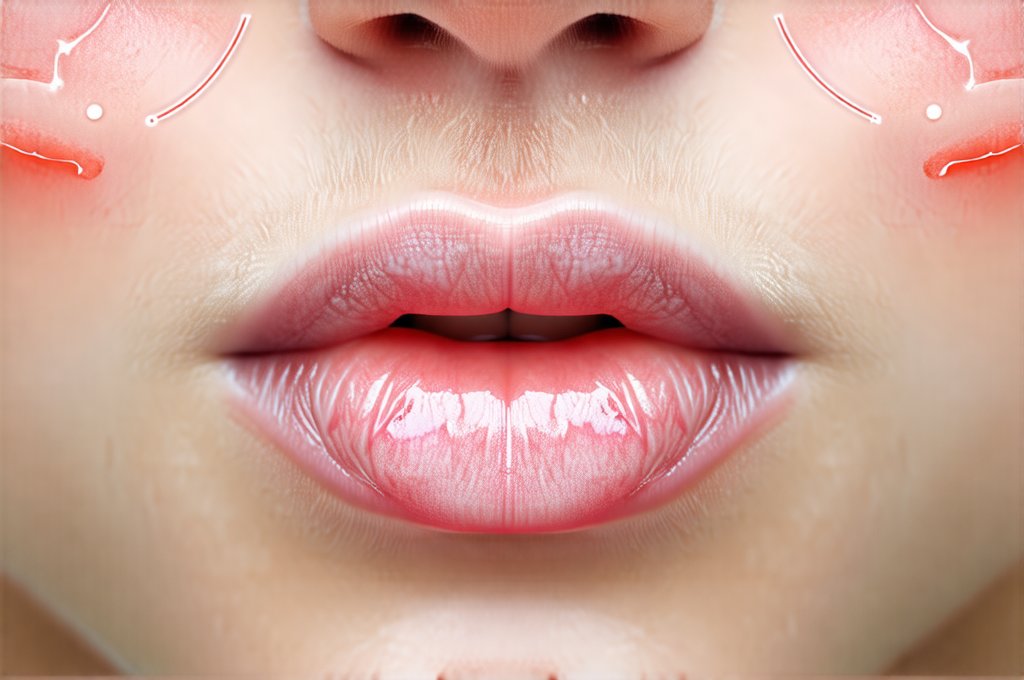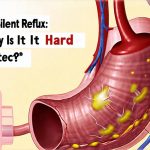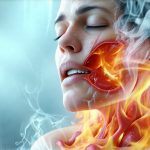Gastroesophageal Reflux Disease (GERD), commonly known as acid reflux, is a prevalent condition affecting millions worldwide. While many associate GERD with typical symptoms like heartburn, regurgitation, and difficulty swallowing, its manifestations can be surprisingly diverse, extending beyond the digestive system. This broader spectrum of symptoms often leads to misdiagnosis or delayed recognition of the underlying issue. Individuals experiencing seemingly unrelated sensations—such as tingling in the lips or face—might not immediately connect them to their GERD, creating a frustrating cycle of seeking explanations elsewhere. Understanding these atypical presentations is crucial for prompt diagnosis and effective management.
The connection between GERD and neurological symptoms like tingling isn’t always straightforward. It’s rarely a direct physical irritation. Instead, the link often stems from nutritional deficiencies caused by long-term GERD, vagus nerve stimulation or irritation due to acid exposure, or even psychological factors related to chronic discomfort. Chronic inflammation associated with GERD can also contribute to systemic effects that impact neurological function. Recognizing these potential pathways is vital for a holistic approach to understanding and addressing the condition, moving beyond simply suppressing stomach acid. It’s important to note that tingling sensations should always be evaluated by a healthcare professional to rule out other serious causes.
Atypical GERD Symptoms: Beyond Heartburn
GERD’s reputation as solely a digestive issue is misleading. While heartburn remains the hallmark symptom, its presentation can vary significantly from person to person. Some individuals experience silent reflux, where they have no typical symptoms but still suffer internal damage from acid exposure. Others might encounter atypical manifestations that seem unrelated to digestion, making diagnosis more challenging. These atypical symptoms can include respiratory problems like chronic cough or asthma, hoarseness, and even dental erosion due to stomach acid reaching the mouth. The key takeaway is that GERD isn’t always about burning pain in the chest. It’s a systemic condition with potential for far-reaching effects.
The reason for these diverse symptoms lies in the proximity of the esophagus to other organs and systems. Acid reflux can irritate the vagus nerve, which plays a vital role in regulating various bodily functions, including digestion, heart rate, and even neurological processes. This irritation can lead to referred pain or unusual sensations in different parts of the body. Moreover, chronic inflammation triggered by GERD can contribute to systemic effects that impact multiple organ systems. Identifying these less common symptoms is essential for proper diagnosis and treatment.
It’s important not to self-diagnose based on atypical symptoms. Many conditions can mimic GERD, making accurate assessment crucial. If you experience persistent tingling in the lips or face alongside other digestive issues, or even without them, consulting a healthcare professional is paramount. They can conduct appropriate tests to determine the underlying cause and recommend a suitable course of action.
Nutritional Deficiencies & Their Role
Chronic GERD can interfere with nutrient absorption. The inflammation and damage to the esophagus and stomach lining can impair the body’s ability to effectively process vitamins and minerals. Certain medications used to manage GERD, such as proton pump inhibitors (PPIs), have also been linked to deficiencies in specific nutrients.
- Vitamin B12 deficiency is frequently observed in individuals on long-term PPI therapy. This deficiency can manifest as neurological symptoms like tingling or numbness in the extremities, including the lips and face.
- Iron deficiency anemia, another potential consequence of GERD and its treatment, can also lead to fatigue, weakness, and, less commonly, neurological sensations.
- Calcium and magnesium absorption can be reduced due to changes in gut pH caused by acid reflux or medication use. These deficiencies contribute to muscle cramps, weakness, and even tingling sensations.
Addressing nutritional deficiencies is a crucial part of managing GERD and alleviating associated symptoms. This may involve dietary modifications, supplementation under the guidance of a healthcare professional, or addressing the underlying cause of malabsorption. Regular monitoring of nutrient levels is recommended for individuals with chronic GERD. Understanding how to best manage your nutrition can be vital; consider exploring resources related to stool test for occult blood as part of a comprehensive health assessment.
Vagus Nerve Irritation & Neurological Sensations
The vagus nerve, often referred to as the “wandering nerve,” extends from the brainstem down through the neck and into the abdomen, influencing a wide range of bodily functions. In the context of GERD, acid reflux can irritate this sensitive nerve, leading to a variety of neurological symptoms.
- Acid exposure in the esophagus can directly stimulate or inflame the vagus nerve branches that run along it. This stimulation sends signals to the brain, which may be interpreted as tingling, burning, or even pain in the face, lips, or throat.
- The vagus nerve also plays a role in regulating esophageal motility (muscle contractions). GERD can disrupt this function, further irritating the nerve and exacerbating symptoms.
- Chronic inflammation associated with GERD can contribute to vagus nerve dysfunction over time, leading to persistent neurological sensations.
Treating the underlying GERD is often key to alleviating vagus nerve irritation. This may involve lifestyle modifications (dietary changes, weight management), medication to reduce acid production, or, in severe cases, surgical intervention. If you suspect a more complex issue, exploring options like endoscopic ultrasound (EUS) could provide further insight.
Psychological Factors & Somatization
Chronic pain and discomfort associated with GERD can significantly impact mental health. Stress, anxiety, and depression are common comorbidities of GERD, creating a complex interplay between physical and psychological factors. Sometimes, the focus on physical symptoms can lead to somatization, where psychological distress manifests as physical sensations.
- The constant worry about experiencing heartburn or other GERD symptoms can heighten sensitivity to bodily sensations, making individuals more aware of minor tingling or discomfort in the lips or face.
- Anxiety and stress can exacerbate GERD symptoms, creating a vicious cycle of physical discomfort and emotional distress.
- In some cases, the brain may misinterpret normal sensory input as pain or tingling due to heightened nervous system sensitivity.
Addressing psychological factors is an important component of comprehensive GERD management. This may involve therapy, stress reduction techniques (mindfulness, yoga), or medication to manage anxiety or depression. A holistic approach that considers both physical and mental health is often the most effective. K21.9 — GERD without esophagitis can be effectively managed with a combined approach to physical and mental wellbeing.
Diagnostic Approaches & When To Seek Help
Determining the cause of tingling lips or face requires a thorough evaluation by a healthcare professional. The initial assessment will involve a detailed medical history, including questions about your symptoms, dietary habits, medications, and overall lifestyle. A physical examination will also be conducted to rule out other potential causes.
Several diagnostic tests may be used to evaluate GERD and its impact on neurological function:
- Endoscopy: This procedure involves inserting a thin, flexible tube with a camera into the esophagus to visualize the lining and identify any signs of inflammation or damage.
- Esophageal manometry: This test measures the pressure and muscle contractions within the esophagus to assess esophageal motility.
- pH monitoring: This test measures the amount of acid in the esophagus over a period of time, typically 24 hours, to confirm the presence of reflux.
- Blood tests: These can help identify nutritional deficiencies or other underlying medical conditions that may be contributing to your symptoms.
If neurological symptoms are prominent, additional testing may be recommended to rule out other causes, such as nerve damage or autoimmune disorders. It’s crucial to communicate all of your symptoms clearly and accurately with your healthcare provider so they can determine the most appropriate diagnostic approach. Do not attempt to self-diagnose. For a more in-depth look at digestive system function, consider researching upper gi series.
It’s important to seek medical attention if you experience any of the following:
- Persistent tingling in the lips or face that doesn’t improve with time
- Difficulty swallowing or painful swallowing
- Unexplained weight loss
- Chest pain accompanied by shortness of breath or dizziness
- Neurological symptoms such as numbness, weakness, or difficulty speaking.
Understanding colonic transit test results can also help provide a broader picture of digestive health. Additionally, if you are experiencing severe symptoms and concerned about your colon’s health, discuss with your doctor whether flexible sigmoidoscopy is right for you.
Remember, a proactive approach to healthcare is vital for optimal well-being. Don’t hesitate to seek professional guidance if you have concerns about your health. Capsule endoscopy can be a valuable diagnostic tool in certain cases as well.


















